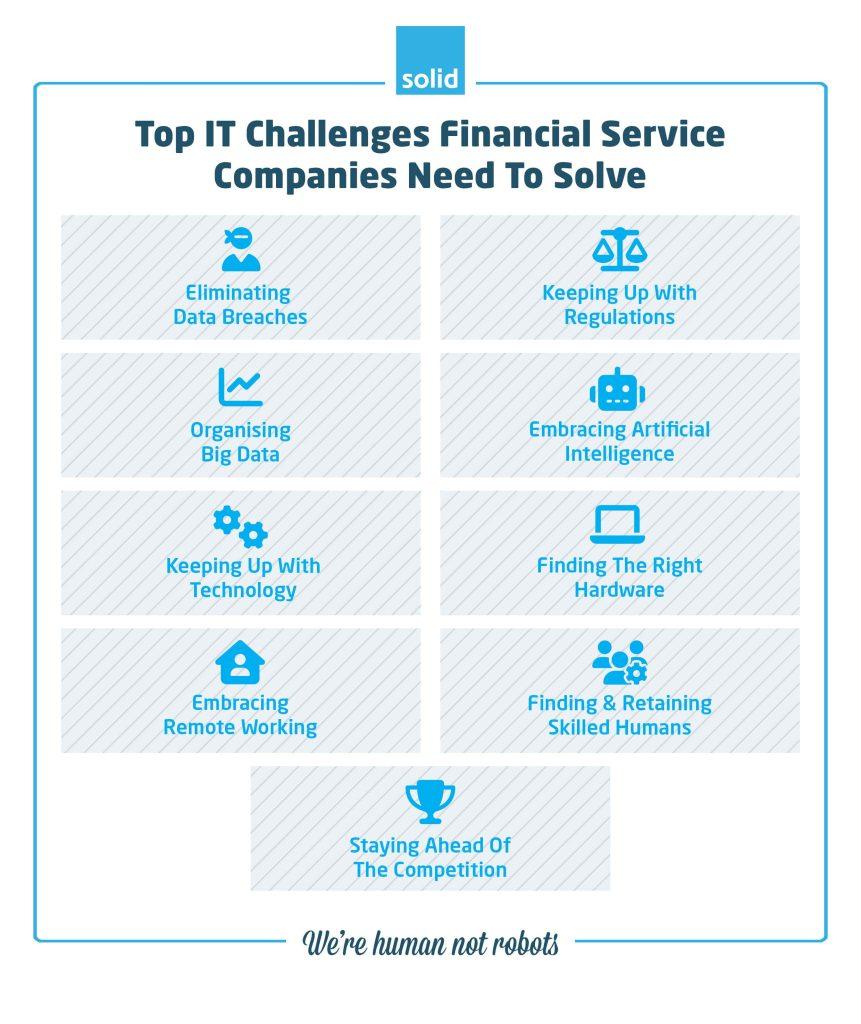
The finance industry has always been ahead of the curb when it comes to technology adoption. Financial institutions are some of the first to recognise the value of new IT developments, and find ways of putting them to use for their customers. This is why Fintech businesses have been booming over the past few years.
But technology moves at a mile a minute, and even businesses that understand the impact of IT in the finance industry are struggling to keep up with the advances in tech. Finding the right solutions to adopt, for the right reasons, is challenging in this modern age, and this is only one of the IT challenges in the finance industry.
Top IT Challenges Financial Service Companies Need To Solve

In 2023, financial service providers are experiencing a number of different challenges which need to be resolved in order to operate efficiently, stay ahead of the market, and offer the exceptional service that customers are demanding:
• Challenge Of Eliminating Data Breaches
Data security is critical for every business, but never more so than in the finance industry. Cyber attackers are becoming more sophisticated, more targeted, and more voracious in their attacks, and maintaining a level of security that reduces the risk of data breaches is one of the biggest IT issues in financial services in 2023.
A data breach can be anything from one of your humans sending confidential information to the wrong person, to an attacker gaining access to your systems through a phishing or man in the middle attack, to an email address becoming compromised or a hacker brute-forcing their way into the backend of your website and gaining access to user credentials and more.
Because data breaches can take so many different forms, it’s essential for finance businesses to prioritise cybersecurity in general, and data security in particular. It’s also critical that financial service providers have Disaster Recovery Plans in place to minimise the impact that a data breach could have on their business and their operations.
• Challenge Of Keeping Up With Regulations
On top of having to make sure that the data your finance business processes is secure, you also need to ensure that it meets the requirements set out in IT compliance and regulation acts like South Africa’s POPIA and the EU’s GDPR.
Financial service providers deal with more personal data than most businesses – it’s just the nature of the industry. But while the acts may only govern the storage and processing of personal information, making sure that you comply with them can have a significant impact on all of the data that your business collects and uses.
Between labelling and encryption of sensitive information, ensuring that people have access to the data they need to do their jobs while still keeping certain information confidential, ensuring that your data is stored and backed up in a data centre in the right area of the world, and so many other considerations that need to be factored into your data planning, managing your company’s information can easily become a full-time job.
• Challenge Of Organising Big Data
Businesses in this digital age (and I’m talking about any businesses, not just those in the finance industry), have access to an absurd amount of data. It is truly too much for a person to wrap their head around. Every interaction, every visitor to your website, every email, every phone call, it all comprises data which then gets stored somewhere and, if you’re like most businesses, never looked at again. This wide array of information, which comes in a variety of different forms, is known as ‘big data’, and managing it in the right way to gain meaningful insights for your business is another of the biggest IT challenges in the finance industry in 2023 and beyond.
Thankfully, there are solutions to help you meet this challenge. Tools like Microsoft’s Power BI, which helps you to visualise your business data in different ways, providing you with the meaningful insights that you need to make the right decisions based on the information that you are gathering as a company.
• Challenge Of Embracing Artificial Intelligence
Artificial Intelligence (AI) is advancing in leaps and bound, and businesses that don’t find ways to take advantage of it are swiftly falling behind. There are so many opportunities for financial service providers to adopt AI as part of enhancing their offerings, protecting their clients, and allowing for more effective time management.
Take, for example, developments in fraud detection and prevention. Machine learning has provided us with the capability to analyse huge amounts of data in short spans of time, gaining insights into what normal patterns of activity within accounts looks like, and making it far easier to detect unusual activity that could indicate fraud.
The same principle can be used in determining current and previous market trends, allowing you to predict what future trends may look like, and to better understand and manage the risks that your business, and those of your clients, may face.
• Challenge Of Keeping Up With Technology
With technologies advancing faster than any business could possibly keep up with, knowing the right tech solutions that your finance business should be implementing at any given time is a serious challenge that needs to be addressed. The last thing that you want to be doing is investing money in the latest fads, only to find that they are not helping your business or your customers, and are simply adding to your frustration.
Each business has its own unique challenges, and understanding what these are, what risks you face, what goals you want to achieve, and having an IT company by your side who understands these things as well, will help you to determine the technologies that your business should be implementing. Because you want IT solutions that are going to help you face those challenges, mitigate those risks and exceed those goals. And the right technologies are out there! It’s just a case of knowing what they are and planning ahead to ensure that they are both affordable and adopted throughout your business so that you’re able to take full advantage of them.
• Challenge Of Finding The Right Hardware For Maximum Productivity
A laptop is a laptop is a laptop, right? Wrong.
We see it all the time. Companies need their employees to have computers or laptops so that they’re able to do their work, but they don’t really care what type of laptop it is. As long as it can connect to the internet, that’s all your teams need, isn’t it? So they spend as little as possible on the hardware to get their humans working. Only, the machines themselves work at a glacial pace. You tell the laptop to open a program, and then go make yourself a cup of coffee, knowing that the program will probably only finally open when you’re back at your desk.
This is an extreme example, but in reality, every minute that you spend waiting for a program to open, battling to get information to load, even the time that you spend switching through tabs because you can’t quite find the right spreadsheet among the five you’ve got open, is time wasted. This is why investing in the right hardware – the right laptops, second screens, quality cameras and microphones for virtual meetings – is going to see productivity improving ten-fold. The investment is well worth the efficiency that quality hardware allows for.
• Challenge Of Embracing Remote Working
While the lockdowns of 2020 may have forced many businesses to accommodate team members working from home, many companies are still trying to find ways of embracing remote work as a standard. There are plenty of difficulties to be faced, especially for businesses in South Africa – trying to ensure that each of your humans has access to the equipment and resources that they need, to decent connectivity, to a generator or inverter system in case of loadshedding – for one matter. And then there’s the trouble with trying to build up or maintain a strong sense of connection and collaboration, and a strong company culture, when your teams are hardly ever in the same room together.
These challenges have seen some businesses dismissing remote working as an option altogether. A problematic stance in itself, because study after study has proven that employees are more productive when working from a home environment. Other companies, on the other hand, are taking a hybrid approach to their work environments – having team members work most of the week from their homes, but coming into an office space together on specific days to allow for better connection and one-on-one collaboration. Because there is something special about being in the same room as others – an opportunity to gain experience, to learn from each other, to bond. And this hybrid approach allows companies to take advantage of the increased productivity and flexibility that working from home affords, while not losing the togetherness that is experienced when teams are in the same room with each other.
• Challenge Of Finding And Retaining Skilled Humans
While the rise of remote working has been a boon to some businesses, many others have suddenly found themselves having significant difficulty with finding and retaining talented humans in their companies. This is a problem that South African businesses are far harder hit by than many other countries, and the reason for it is the Rand.
With many international companies embracing remote working conditions, the South African workforce is finding that they are able to apply for global positions, earning stronger salaries in dollars and pounds, than South African counterparts can afford to match.
Facing this challenge is no easy feat. Finance companies across the globe, but in South Africa in particular, are needing to focus more on providing the flexible, culture-focused work environments that will draw talent to them and make it less likely that they’ll want to jump ship at the first opportunity. And technology has a big role in helping financial service providers to offer this kind of environment – putting their humans first by addressing a few of the issues facing financial IT that we’ve already highlighted, like providing quality hardware that makes it easier for them to do their jobs and embracing hybrid working, for example.
• Challenge Of Staying Ahead Of The Competition
The market that financial service providers are finding themselves in is more competitive than ever. It has never been easier for businesses to adopt affordable technology, and your competition are doing exactly that, making it more important than ever before to define your differentiating factors and ensure that the technologies you are using are doing more than just supporting your business. You want them to be pushing you forward, helping you not just to achieve, but to exceed your goals and stay ahead of the competition.
And this is why you need the right technology partner by your side, who is there for more than just troubleshooting and putting out fires. You need Solid Systems.
How Can Solid Systems Help?
As an IT company that has been in action for more than two decades, helping businesses address the top IT challenges in finance industry, we know that being proactive, looking towards the future, and opting for strategic technology planning is the way forward.
We want to see you securing your business against cyber security threats. We want to see you building a company culture that focuses on technology. We want to see you and your humans growing, and elevating human connection to make a difference in your people’s lives.
This is why we offer IT Services that go beyond troubleshooting, and focus on problem-solving. It’s why we help businesses to future-proof their technologies by looking beyond the here and now to where you want to be in 2, 5 or 10 years’ time. We understand the challenges that you face, and are here to help you prepare for them and address them, seeing you working towards your goals and stepping into the future with confidence.
So if you’re ready to work with an IT company that has your best interests at heart, get in touch with Solid Systems today.
Frequently Asked Questions (FAQs)
There are many different IT challenges facing the finance businesses in 2023, from keeping their data secure, to maximising the effect of big data, to keeping up with technology and embracing artificial intelligence. And, as always, there is the challenge of trying to stay ahead of the competition in an industry which is more competitive than ever before.
The way the companies around the world operate has shifted over the past three years. A need to embrace remote working, which was highlighted during the Covid-19 lockdowns of 2020, has led to a change in the way we as humans look at work. The result has been that many businesses are struggling to find and retain skilled employees, particularly in South Africa, as people are instead opting to work for international companies, earning stronger salaries in dollars and pounds than local businesses can afford to match. This has seen companies, especially in the financial services industry, focusing instead on building up a company culture that leverages technology to elevate human connection more than simply offering a competitive salary.





